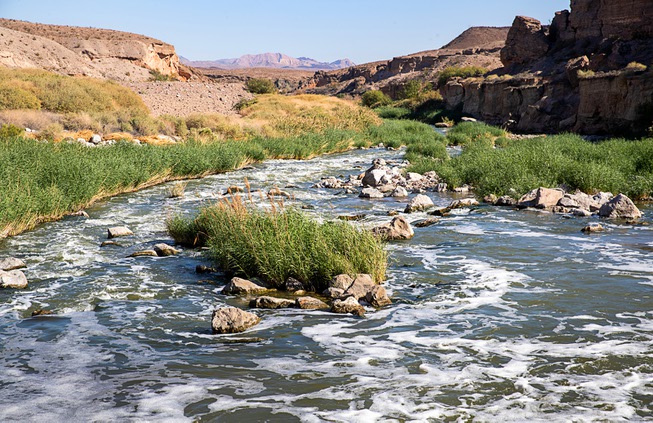
A view of the Las Vegas Wash, east of Lake Las Vegas, as water flows to Lake Mead Tuesday, Oct. 24, 2023.
Tuesday, Dec. 12, 2023 | 2 a.m.
A proposal in the U.S. Senate would bring $25 million in additional funding to Southern Nevada to help combat drought and fund erosion control projects around the Las Vegas Wash.
The bill, introduced by Nevada’s Democratic U.S. Sens. Catherine Cortez Masto and Jacky Rosen, is dubbed the Las Vegas Wash Program Extension and would help the Southern Nevada Water Authority and Bureau of Reclamation’s various research and restoration activities.
“Combating drought requires creative solutions, and that includes working together to make sure the Las Vegas Wash can continue to clean and funnel water from the Las Vegas Valley into Lake Mead,” Cortez Masto said in a statement last week. “This legislation will help safeguard Las Vegas’ water supply.”
The Las Vegas Wash is considered an “urban river” connecting the Las Vegas Valley with Lake Mead, the region’s primary source of drinking water, according to the Las Vegas Wash Coordination Committee.
It carries more than 200 million gallons of water per day, including city runoff, shallow groundwater, stormwater and reclaimed water — which has been treated and released into the wash.
The Southern Nevada Water Authority said this water contributes to nearly 2% of the water in Lake Mead.
Wetlands Park was also created because of the wash, and it now acts similar to kidneys that filter pollutants — like oil and fertilizer residue — from the flowing water, said the Las Vegas Wash Coordination Committee.
About half of the 12-mile Las Vegas Wash runs through the park, according to Elizabeth Bickmore, the program manager at Wetlands Park.
The Las Vegas Wash and ponds in the nature preserve are considered “non-fishable and -swimmable” according to the State of Nevada Board of Wildlife Commissioners. About 80% of the water moving through the park is clean water, Bickmore said.
“The charm and greatness of the Wetlands Park and the Las Vegas Wash is this all used to be desert, and it was just a dry wash,” Bickmore said. “With the addition of people in the Las Vegas Valley and water treatment, they started discharging water to the wash, and then Clark County built a Wetlands Park around it and so with that we brought water to the desert.”
But drought, erosion and garbage have made it harder for the wash to deliver that water to Wetlands Park and Lake Mead.
To begin combating some of these problems, the Water Authority in 1998 created the Las Vegas Wash Coordination Committee, a panel with more than 24 local, state and federal agencies; environmental groups; businesses; private citizens; and representatives from UNLV.
The committee has since developed a long-term management plan to stabilize the Las Vegas Wash and “enhance the surrounding vegetation,” the SNWA said.
Some of its more recent projects include stabilizing the wash’s banks; adding plant life to more than 630 acres of the wash; and removing more than 500,000 pounds of garbage from adjacent areas.
Perhaps their biggest accomplishment was the completion of the wash weir construction, which used concrete rubble from imploded casinos such as the Stardust and Westward Ho to build 21 weirs, or low dams, designed to reduce erosion and stabilize the channel.
By slowing the flow of water and creating ponds, these weirs help create wetlands with plant life that can further help with water filtration, according to the SNWA.
The proposal will help fund even more of these efforts, according to Cortez Masto’s office. It isn’t the first time the senators have worked to combat drought.
Both women helped pass the Infrastructure Investment and Jobs Act — also known as the Bipartisan Infrastructure Law — in 2021, which has made “a historic amount of funding” available for water and wastewater infrastructure projects over the next five years.
Cortez Masto, alongside Sens. Mark Kelly, D-Ariz., and Michael Bennet, D-Colo., pushed to include $4 billion in funding for the Bureau of Reclamation to fight drought in states surrounding the Colorado River in the Inflation Reduction Act of 2022. Rosen supported the bill.
“As we continue to combat the extreme drought facing Nevada, it’s critical that we invest in our existing water infrastructure,” Rosen said in a statement. “I’m proud to help introduce this legislation to address water resource challenges and support important restoration efforts around the Las Vegas Wash.”
The Las Vegas Wash legislation, Senate Bill 3418, has been referred to the Senate Committee on Environment and Public Works.
